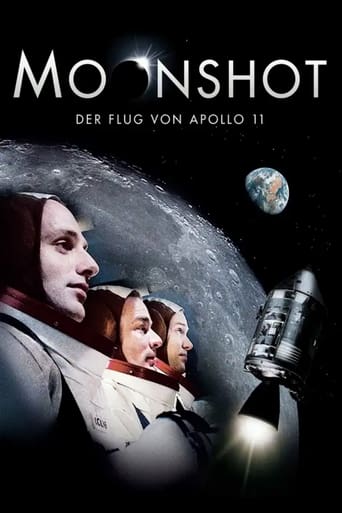david-byrne
This film was OK, but it was destroyed with mistakes like a whooshing sound in once scene as command module and lunar module went past near the moon. It might appeal to those who know nothing about science, but to the majority of educated viewers, it is an insult to their intelligence. The final straw was when about half way thought the film, green 7-segment LED digital displays were in view. They were not even invented in 1969 and thus were not used in Apollo 11. I had to switch it off at that point - I had enough. The acting was reasonable, but on the whole I found this film boring. At least in The Dish movie (which was quite fictional), they used authentic equipment used in 1969. Producers should do their homework before embarking on a topic they know little of nothing about.For the purists out there, don't bother with this film. Nothing beats the telecasts during moon landing in July 1969.
Matthew Kresal
With the fortieth anniversary of the Apollo 11 moon landing upon us it is no surprise that there would be a dramatization of that historic flight to accompany the anniversary. That film would be Moonshot, which is at least the third dramatization of the Apollo 11 Moon landing (the first two being the 1996 TV movie Apol1o 11 and the episode from the 1998 miniseries From The Earth To The Moon entitled "Mare Tranquilitatis"). While it covers much of the same ground Moonshot proves to be just as interesting and watchable as either of those efforts even with some drawbacks.The acting of the film is fine stuff. The three astronauts were especially well cast with Daniel Lapaine as Neil Armstrong, James Marsters as Buzz Aldrin and Andrew Lincoln as Michael Collins. Lapaine in particular excels in the role of Armstrong and wonderfully captures the man who would go down in the history books as the first man on the Moon. They are supported by a fairly good supporting cast especially from the actresses playing their wives. Moonshot has some rather nice performances that are convincing without being potentially cliché or overly serious.The film is also blessed with a nice script by writer Tony Basgallop. Despite dealing with a familiar story, Basgallop manages to bring in some new details into the story which shed a new light on events (such as the UFO sighting by the crew on the way to the Moon). Basgallop's script takes the viewer through the back story without taking too long or being underwhelming in building up the journey's of these three men before the flight itself. Basgallop also handles dialog well for the most part thought here are a few moments where the film delves a little too heavily into clichés such as argument between Armstrong and Aldrin after a simulator test goes wrong (a better handled version can be seen in From The Earth To The Moon's "Mare Tranquilitatis"). The script, despite some occasional dialog issues, is a nice one and serves as a nice basis for the film.Where the film has the biggest drawbacks is in its production values. Depsite some well designed spacecraft interiors which could rival those used in Ron Howard's feature film Apollo 13 let alone the aforementioned previous film tellings of Apollo 11, the earthbound sets reflect the film's rather low budget. The sets of the NASA offices are bare and look as those that are thrown together rather quickly with little thoughts for personal touches that should be there such as pictures on the walls for example. In particular there is a set for one of the press conferences that is simply the astronauts sitting in front of a bare wall with an American flag hung behind them. The result is a dull looking set to be honest. There's also the astronauts suits which lack patches and sorted items that should be on the suits which hint at getting things right in broad strokes but not inn finer details. The film's single biggest drawback is an over reliance on archival materials. Once the Saturn V launches, everything not taking place relating to the astronauts is archival footage. all the mission control sequences are told from archival footage so there's not real characters from mission control as a consequence. Even during the landing and moonwalk the reliance on archival material continues to the point where the actors even end up lip-syncing to some of the original audio material. All that seems a shame especially in light of the film's rather nicely CGI work. Sadly these faults can be rather distracting at times from the fine acting and nice script which is a shame.Despite the drawbacks of a low budget and an over reliance on archival material, Moonshot still makes for some interesting viewing. With some fine performances especially from the actors playing the three astronauts and a nice script by Tony Basgallop, the familiar story of Apollo 11 gets a nice retelling here. While it may be lacking in style in terms of production values (espeically in comparison with "Mare Tranquilitatis") it certainly isn't lacking in substance and that's what counts.
pawebster
Everyone knows the basic story, and when there is an anniversary there is a glut of documentaries. This dramatized version is different, in that it focuses mainly on the human relationships. It makes Buzz Aldrin into an ambitious and slightly abrasive character who would quarrel with Neil Armstrong, if only the the latter were not so easy-going (not to say bland). Well, that's how it's played here. I don't know how true it is.It's entertaining and well acted. Daniel Lapaine has a good (moon) shot at Neil Armstrong - not an easy thing to do.I'd only really criticize the structure of the film. It is packed with flashbacks, so much so that it's quite confusing at times.
